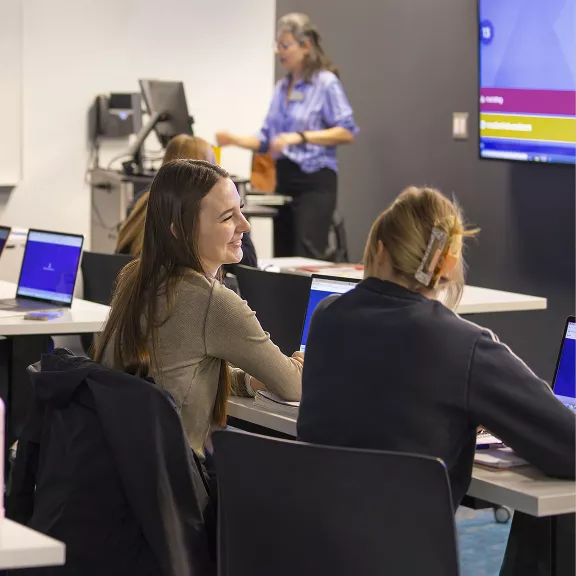Curriculum & Pedagogy
Driven by evidence-based practice and decision-making, we guide and support faculty in all aspects of their teaching practice, including curriculum development, program review and course (re)design.
Development, Review & Redesign
New Program Development
RDP is responsible for the quality of its curricula.
The CTLS ensures stewardship of curricula and can assist you in any curriculum development project.
Learning Designers guide you (as the content expert) and your curriculum through the stages of development, approval, review and revision.
Program Review
The CTLS provides guidance to faculty during the program review process. They ensure that the current curriculum is documented correctly, aligns with policies and meets standards.
Course Re(design)
If you have a course that is in need of a major renovation, we can assist with aligning course and program outcomes, lesson planning, incorporating engaging learning activities, embedding technology, reviewing forms of assessment and preparing for online delivery.

Outcomes Based Curriculum Design
RDP uses Curriculum Design based on outcomes that permits instructors to measure what students are able to do, and what concepts they have learned, by the end of each course.
Program Learning Outcomes
Goal: Identify what a successful graduate from the program will know, understand, be able to do and the behaviours/attitudes that they will have.
Considerations: Developing program learning outcomes might include any of these areas:
- Literacies
- Communication
- Intellectual Capacity
- Ethics
- Wellness
- Citizenship
- Experiential Capacity
- Indigenous Knowledge and Awareness
Institutional Learning Outcomes
Literacies
- Information, digital, reading, visual, scientific, quantitative, financial and technological literacies
Communication
- Effective communication across formats, including oral, written, visual and digital
Intellectual Capacity
- Analytical thinking, curiosity, creativity, problem solving, logical thinking, depth and breadth and life-long learning
Ethics
- Ethical awareness, reasoning and behaviour, professional and academic standards and social responsibility
Wellness
- Understanding and valuing one's self holistically including all dimensions of wellness, resiliency, time management, personal organization, self-care and self-management
Citizenship
- Local to global citizenship, environmental awareness, social responsibility, civic engagement, historical awareness, cultural knowledge, diversity awareness, inclusion and social justice
Experiential Capacity
- Professional and practical skills, professional preparedness, practical experience, application of theory to practice, ability to work autonomously, in groups/teams and in interdisciplinary contexts
Indigenous Knowledge and Awareness
- Understanding and respecting the history, culture, languages, perspectives and present-day communities of Indigenous Peoples
Course Learning Outcomes & Elements
Purpose: Course Learning Outcomes are clear statements of what students will be able to do outside the classroom as a result of what they have learned in the course.
Goal: Course Learning Outcomes are comprised of specific knowledge, skills and attitudes to be mastered by learners upon successful completion of the course.
- Outcomes are clear statements of what students will be able to do outside the classroom as a result of what they have learned in the course
- Outcomes are written using measurable verbs first categorized by Benjamin Bloom into three domains: Cognitive, Psychomotor and Affective.
- Are measurable and therefore, amenable to assessment
- Form the basis of identifying important concepts and designing learning and student assessment
- Align with Program Outcomes

Pedagogy
The Centre of Teaching, Learning and Scholarship (CTLS) is committed to helping faculty select and implement learner-focused, evidence-based pedagogy into their educational practices.
We help you shift the focus from the instructor as the source of knowledge to the learner as the co-constructor of knowledge.
The CTLS offers individualized consultation sessions.
The CTLS supports faculty with:
Course Development & Delivery
The CTLS assists faculty with implementing learner-centered strategies into their teaching practices.
We consult with faculty and programs on how to build authentic assessments, plan engaging lessons, encourage student autonomy and foster inclusive classroom communities.
Teaching Development
The CTLS offers many professional development opportunities for faculty and programs to increase their knowledge and skills around how best to align their practices with Learner-Centred Practice.
Teaching Philosophy
The CTLS assists individual faculty with drafting a Teaching Philosophy, a statement illustrating one’s beliefs and values about teaching and learning and how they manifest in the classroom.
PD Opportunities
We offer professional development opportunities for faculty.
Join us for these upcoming sessions.